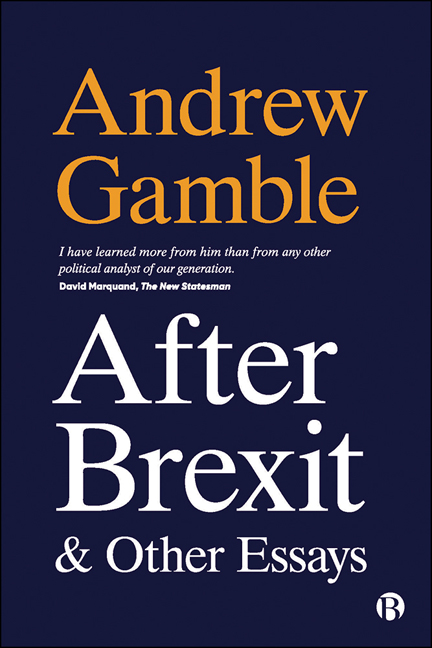Book contents
- Frontmatter
- Dedication
- Contents
- Preface
- Introduction: Historical Contexts
- Notes on the Essays
- 1 After Brexit (2019)
- 2 Explanations of British Decline (1999)
- 3 The European Disunion (2006)
- 4 The Anglo–American World View (2019)
- 5 The Free Economy and the Strong State (1979)
- 6 Thatcherism and Conservative Politics (1983)
- 7 Economic Growth and Political Dilemmas (1983)
- 8 The Crisis of Conservatism (1995)
- 9 The Thatcher Myth (2015)
- 10 Theories of British Politics (1990)
- 11 The Constitutional Revolution in the United Kingdom (2006)
- 12 What’s British about British Politics? (2016)
- Epilogue: Last Thoughts
- Notes
- Acknowledgements
- Index
5 - The Free Economy and the Strong State (1979)
Published online by Cambridge University Press: 22 December 2021
- Frontmatter
- Dedication
- Contents
- Preface
- Introduction: Historical Contexts
- Notes on the Essays
- 1 After Brexit (2019)
- 2 Explanations of British Decline (1999)
- 3 The European Disunion (2006)
- 4 The Anglo–American World View (2019)
- 5 The Free Economy and the Strong State (1979)
- 6 Thatcherism and Conservative Politics (1983)
- 7 Economic Growth and Political Dilemmas (1983)
- 8 The Crisis of Conservatism (1995)
- 9 The Thatcher Myth (2015)
- 10 Theories of British Politics (1990)
- 11 The Constitutional Revolution in the United Kingdom (2006)
- 12 What’s British about British Politics? (2016)
- Epilogue: Last Thoughts
- Notes
- Acknowledgements
- Index
Summary
During the last ten years the long post-war period of expansion and stability has come to an end. We are living through a crisis that should never have happened, the crisis that Keynesian techniques and social democratic policies and institutions were supposed to have banished for ever, because they had overcome the tendency of the capitalist economy towards deficient demand and underconsumption. No slump on anything approaching the scale of the 1930s has occurred, and the pattern of economic performance has been varied, but the overall slowdown in rates of economic growth has still been marked. There has been a deep-seated crisis of profitability reflected both in declining short-run rates of return and a fall in long-term opportunities for investment. Barriers to further rapid accumulation have multiplied and determined the ground on which major conflicts have erupted: struggles over pay, new technology and employment; struggles over the size and composition of public expenditure; and struggles over trade and financial imbalances between surplus and deficit states.
The most striking feature of the new recession which divides it so sharply from the last great crisis in the world economy is the behaviour of the price level. Unemployment has been rising steadily, but it has been inflation that has repeatedly threatened to get out of control, and in the face of which economic policy-makers have appeared most powerless. Inflation is in turn a contributor to the instabilities in the financial markets, the imbalances in trade, and to the fiscal crisis of the state and has also done much to undermine the political cohesion of the major states. With the spread of uncertainty and instability it is hardly surprising that the reputation of governments for successful economic management has rapidly waned and that politicians, having benefited during the long years of boom from the identification of economic prosperity with government economic policies, now suffer from the identification of those same policies with the dismal succession of crises and failures over which they have to preside. In Britain where the problem of relative economic decline has been aggravated by the impact of the recession, no government has won reelection after serving a full term since 1959, and there has been a significant decline in support for both major parties (most notably in 1974 but still marked in 1979).
- Type
- Chapter
- Information
- After Brexit and Other Essays , pp. 91 - 112Publisher: Bristol University PressPrint publication year: 2021



